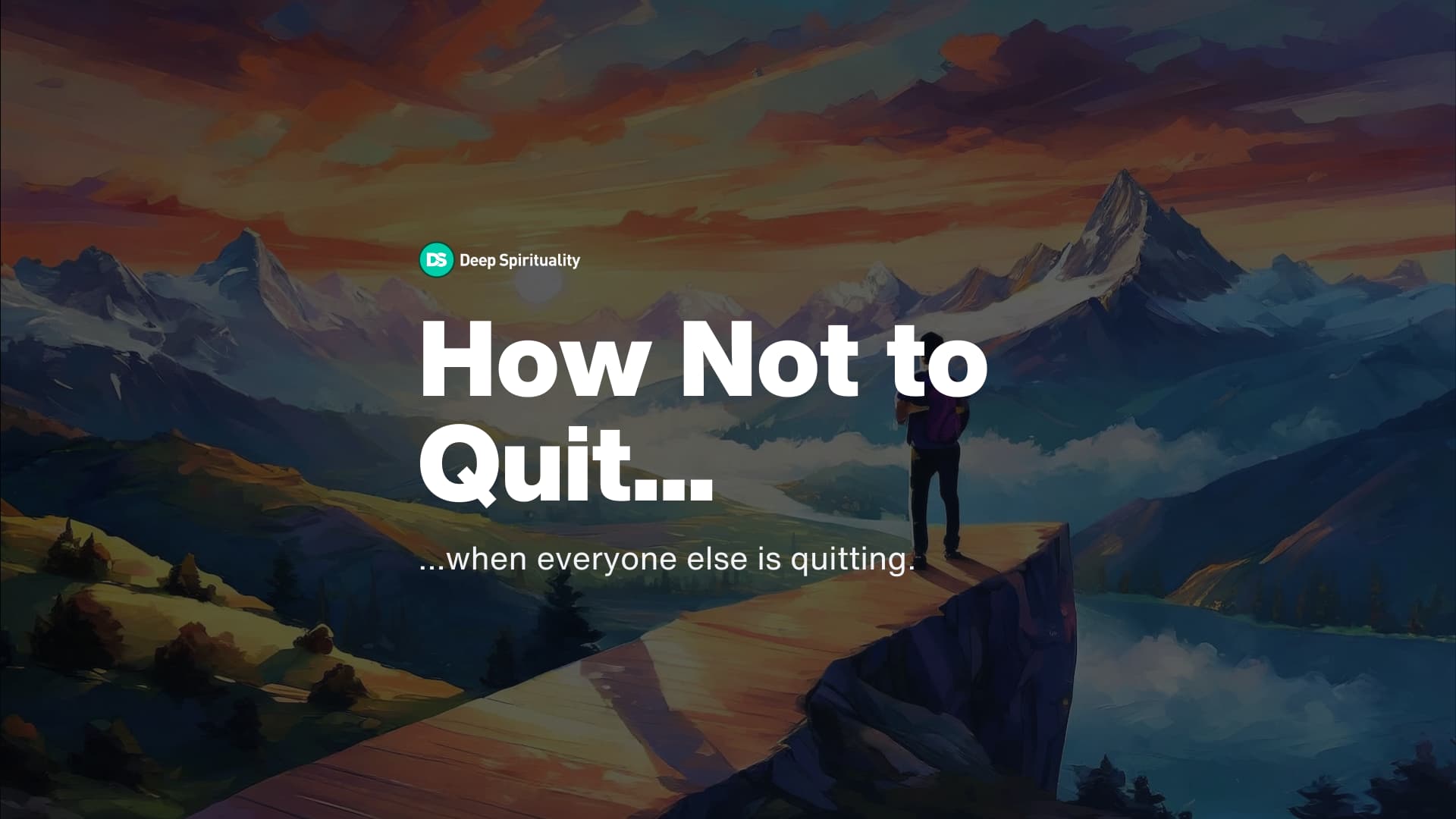Contents
Contents
When your lives bear abundant fruit, you demonstrate that you are my mature disciples who glorify my Father!
John 15:8 TPT
Conversations and personal reflection have led me to question one of my spiritual assumptions.
When I became a Christian, among the most attractive truths was the opportunity God gives us to change. His promise of repentance and forgiveness was an invitation to lifelong change — or so I thought.
Recently, in my conversations with Christian after Christian, my discovery has been that many are tired of change. Some wonder when they can relax and simply enjoy being a Christian without the burden of change.
As we dug deeper in these conversations, what became apparent was how many people felt persistent anxiety over the expectation to change.
I certainly sympathized; I have felt on many occasions the burdensome weight of my need to change my thinking, character, and sin.
But this anxiety struck me as a departure from my first attraction to Jesus.
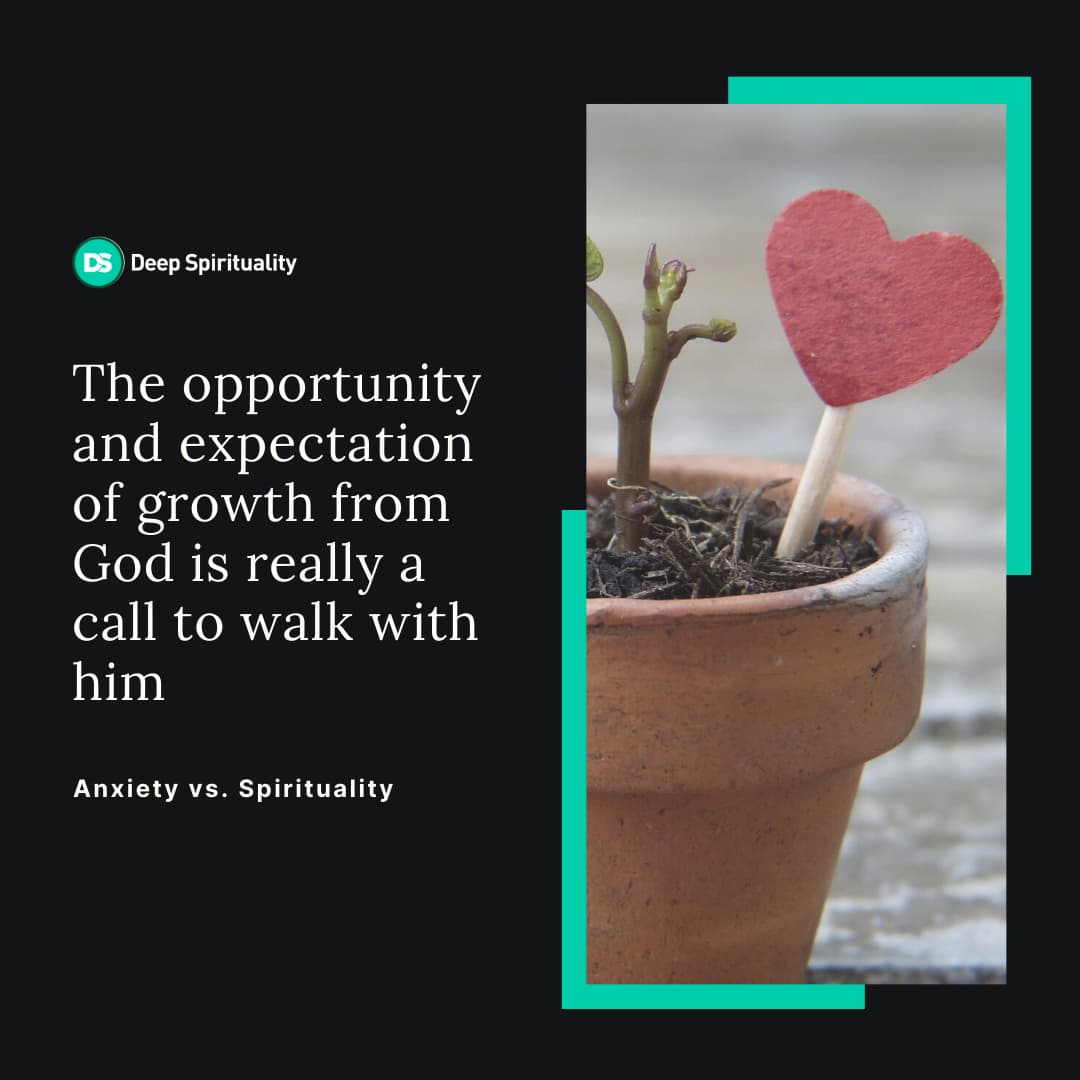
The Jesus I got to know when I became a Christian provided me with never-ending forgiveness and the accompanying opportunity to start new every day, to continue the pursuit of my best self.
John 15:8 and many other scriptures brought clarity to the emotional conflict we all feel between the call to grow and our desire to experience satisfaction and happiness.
Read more: Why Am I So High-Strung? 5 Signs Your Anxiety is Owning You
John 15:1-7 teaches us our growth and transformation flows from our relationship with Jesus, which means growth will be a joyful experience when it is a byproduct of walking with God.
The opportunity and expectation of growth from God is really a call to walk with him, to allow him to transform our lives through the power of the Spirit described in 2 Corinthians 3:17-18 (NIV):
Now the Lord is the Spirit, and where the Spirit of the Lord is, there is freedom. [18] And we all, who with unveiled faces contemplate the Lord’s glory, are being transformed into his image with ever-increasing glory, which comes from the Lord, who is the Spirit.
2 Corinthians 3:17-18 NIV
Why don’t we enjoy this opportunity and expectation of growth from God? The simple answer is that we are applying human rather than spiritual effort, something explained in Galatians 3:3 (NET):
Are you so foolish? Although you began with the Spirit, are you now trying to finish by human effort?
Galatians 3:3 NET
My conflict was completely resolved when I realized that my burden over the opportunity for and expectation of spiritual growth came from pursuing change in a self-reliant way.
This self-reliance is one of the themes of the book of Galatians, and in chapter 4 we see this human effort will steal our joy.
Where then is your sense of happiness now? For I testify about you that if it were possible, you would have pulled out your eyes and given them to me!
Galatians 4:15 NET
This led me to a simple conclusion. Self-reliance leads to anxiety, and some of this anxiety is over our sense that God wants us to grow. It occurred to me that if we can become God-reliant rather than self-reliant, we will enjoy how God transforms our life.
I decided the best way to become God-reliant would be to look at the scriptures for solutions to our anxiety problem.
The reality I discovered was that it is anxiety that makes us feel burdened in life, whether that burden is from growth or any of a million other things.
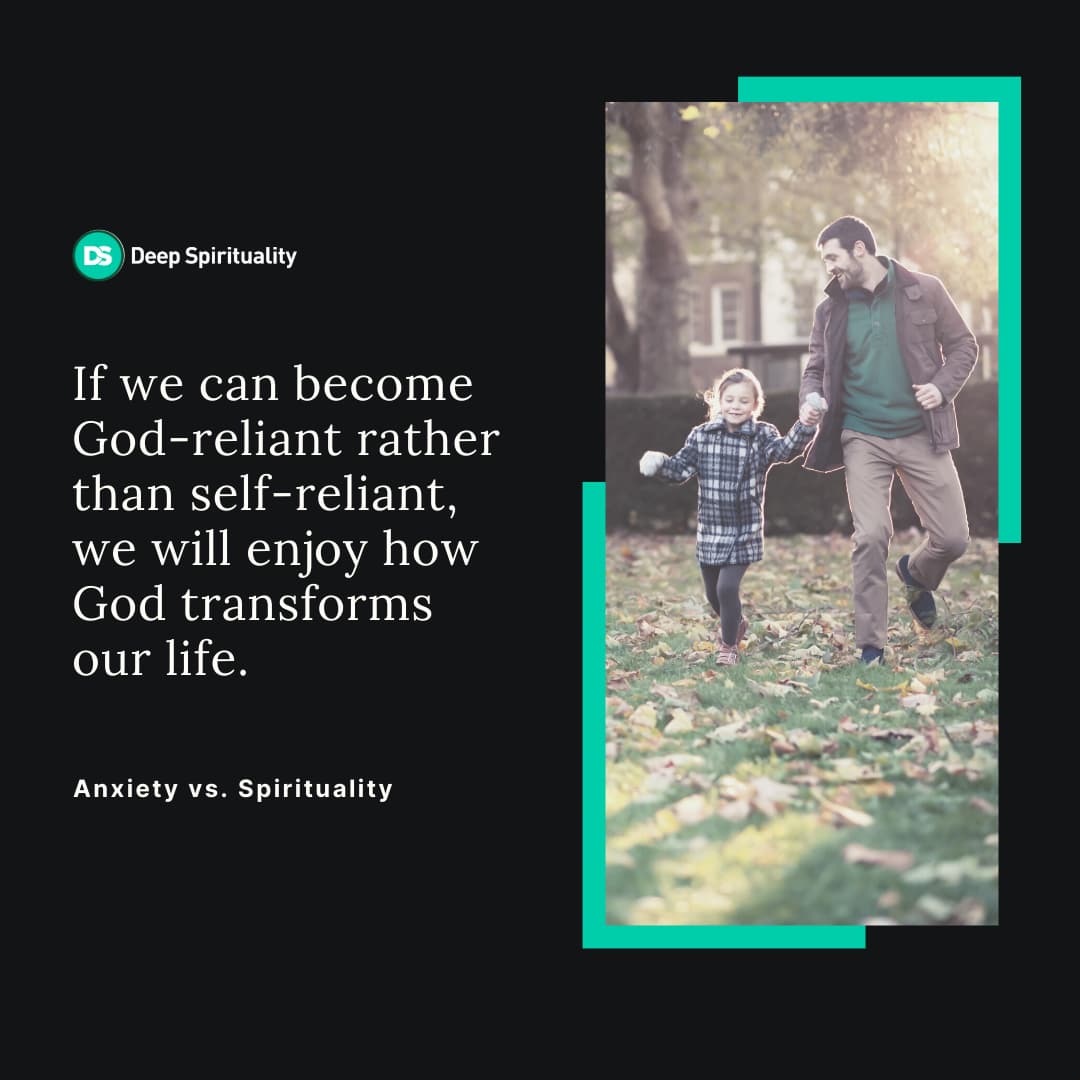
Simply put, anxiety is the enemy of spirituality.
We must overcome this anxious experience of life or it will steal the opportunities we have to experience the joy of walking with God. It will also stop us from experiencing the kind of transformative growth that improves the quality of our lives as well as our capacity to be satisfied.
Anxiety is the enemy of spirituality
Surrender your anxiety! Be silent and stop your striving and you will see that I am God. I am the God above all the nations, and I will be exalted throughout the whole earth.
Psalm 46:10 TPT
The American Psychological Association defines anxiety as “an emotion characterized by feelings of tension, worried thoughts and physical changes like increased blood pressure.”
Anxiety is an emotion. Everyone experiences anxiety because it is an emotion, and as human beings we all have emotions.
Across thirty years of working in the for-profit, non-profit, sports, and religious worlds, one constant I have found is the large number of people with whom I have worked, including myself, who are either unaware of or unwilling to admit their anxiety.
Read more: How to Stop Worrying and Start Trusting God: 15 Helpful Tips
Anxiety is an emotion, but many of us treat it like it is a disorder. We often conceal our anxiety because we are aware of the prejudice experienced by those with mental health challenges.
But because anxiety is an emotion, those “feelings of tension, worried thoughts, and physical changes like increased blood pressure” will happen regardless of whether or not we choose to admit how anxious we are.
Rather than fall prey to the unjustified and irrational prejudice against those with mental health challenges, we should accept, admit, and share our anxiety. We should do this in hopes that when each one of us comes to grip with our anxiety, we can help not only ourselves, but develop the empathy necessary to respect those who experience this emotion at heightened levels.
Anxiety is an emotion. Everyone experiences anxiety because it is an emotion, and as human beings we all have emotions.
Psalm 46:1 (TPT) describes God as “a safe and powerful place of refuge.” The psalmist sees God as “a proven help in time of trouble.” With intimate gratitude he says to God in our hearing, you are “always available whenever I need you.”
Psalm 46 is poetry and song meant to share the intimacy of this writer’s walk with God. He describes God as an unwavering source of confidence even in the stormiest moments of life:
So we will never fear even if every structure of support were to crumble away. We will not fear even when the earth quakes and shakes, moving mountains and casting them into the sea. [3] For the raging roar of stormy winds and crashing waves cannot erode our faith in you. Pause in his presence
Psalm 46:2-3 TPT
Reading on, we learn about the spiritual confidence of the person who chooses to focus on God:
God has a constantly flowing river whose sparkling streams bring joy and delight to his people. His river flows right through the city of God Most High, into his holy dwelling places. [5] God is in the midst of his city, secure and never shaken. At daybreak his help will be seen with the appearing of the dawn.
Psalm 46:4-5 TPT
This writer’s proclamation is meant to touch and move hearts to see God as a wonderful relationship. God is the possessor of the sovereign power necessary to help us conquer this life, not a mere author of a set of life rules.
Everyone look! Come and see the breathtaking wonders of our God. For he brings both ruin and revival. He’s the one who makes conflicts end throughout the earth, breaking and burning every weapon of war.
Psalm 46:8 TPT
After his testimony about the breathtaking power of God, we discover that this author’s poetic message is for us to surrender our anxiety, stop our striving to get more or finish first in our effort to impress people, and instead choose to think and live a spiritual life.
We do this by keeping our focus on God and believing in his love. As we trust in the sovereignty of God, we live peaceful, productive, and satisfying lives.
Surrender your anxiety! Be silent and stop your striving and you will see that I am God. I am the God above all the nations, and I will be exalted throughout the whole earth.
Psalm 46:10 TPT
The spirituality necessary to overcome anxiety starts with:
- Seeking to understand the true meaning of spirituality
- Recognizing spirituality is a choice
- Surrendering our anxiety over our inability to control life
- Deciding to stop overreaching, overthinking, overworking, and overreacting
- Silencing the internal voices keeping us enslaved to the false definitions of happiness
- Starting to treat God like he is God instead of an imaginary friend or comfort toy.
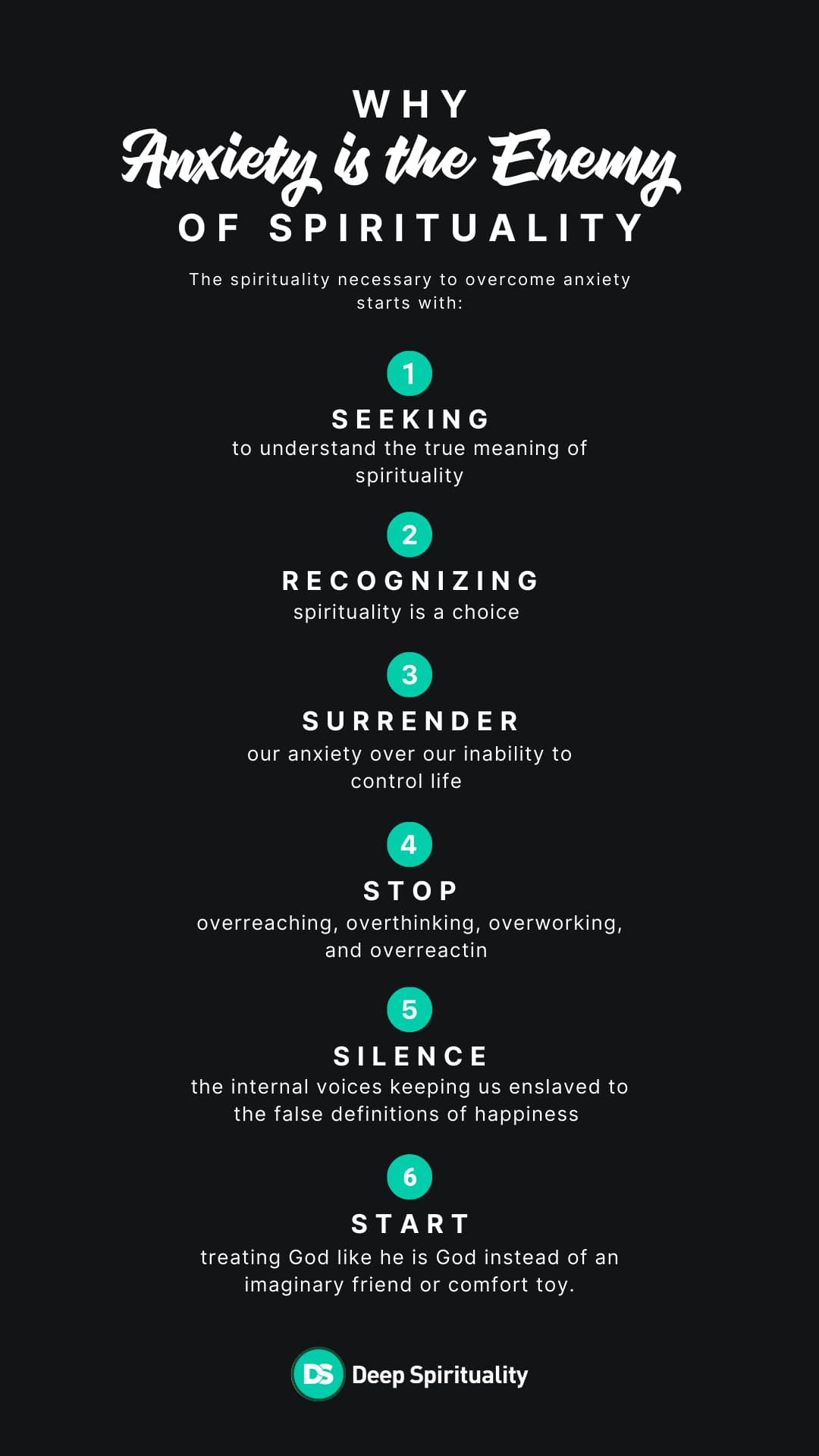
Seeking to understand the true meaning of spirituality
Don’t keep hoarding for yourselves earthly treasures that can be stolen by thieves. Material wealth eventually rusts, decays, and loses its value. [20] Instead, stockpile heavenly treasures for yourselves that cannot be stolen and will never rust, decay, or lose their value. [21] For your heart will always pursue what you value as your treasure.
Matthew 6:19-21 TPT
Anxiety is the enemy of spirituality because our anxieties almost always focus us on the material. Mark 4:19 (NIV) makes this point when it says about the seeds that fell among the thorns, “but the worries of this life, the deceitfulness of wealth and the desires for other things come in and choke the word, making it unfruitful.”
Defeating anxiety begins with adopting a spiritual rather than material outlook on life — living a life where we choose to value the unseen over the seen.
This choice to live a spiritual life focused on the unseen is described in 2 Corinthians 4:18 NIV which says, “So we fix our eyes not on what is seen, but on what is unseen, since what is seen is temporary, but what is unseen is eternal.”
Recognizing spirituality is a choice
How could you worship two gods at the same time? You will have to hate one and love the other, or be devoted to one and despise the other. You can’t worship the true God while enslaved to the god of money!
Matthew 6:24 TPT
The first choice of a person who chooses to value the unseen and live a spiritual life is to choose the “true God” instead of “the god of money.”
This is a choice about the source of our confidence.
Do we make God our source of confidence, relying on him to guide our lives toward the promised beautiful life described in Romans 8:28 (Voice)? Do we make money our source of confidence, relying on ourselves to obtain the power, position, prestige, and possessions we think will keep us safe and secure?
There are three questions we can ask ourselves to help us determine whether we are living a life of God-reliance or self-reliance.
- Do I measure my success by the level of my devotion to God or on my status among the people of this world?
- Do I embrace (love) or resist (hate) the idea of making my first priority reading the Bible and praying each morning?
- What increases my happiness most – knowing God receives pleasure from my life or receiving praise from people about my life?
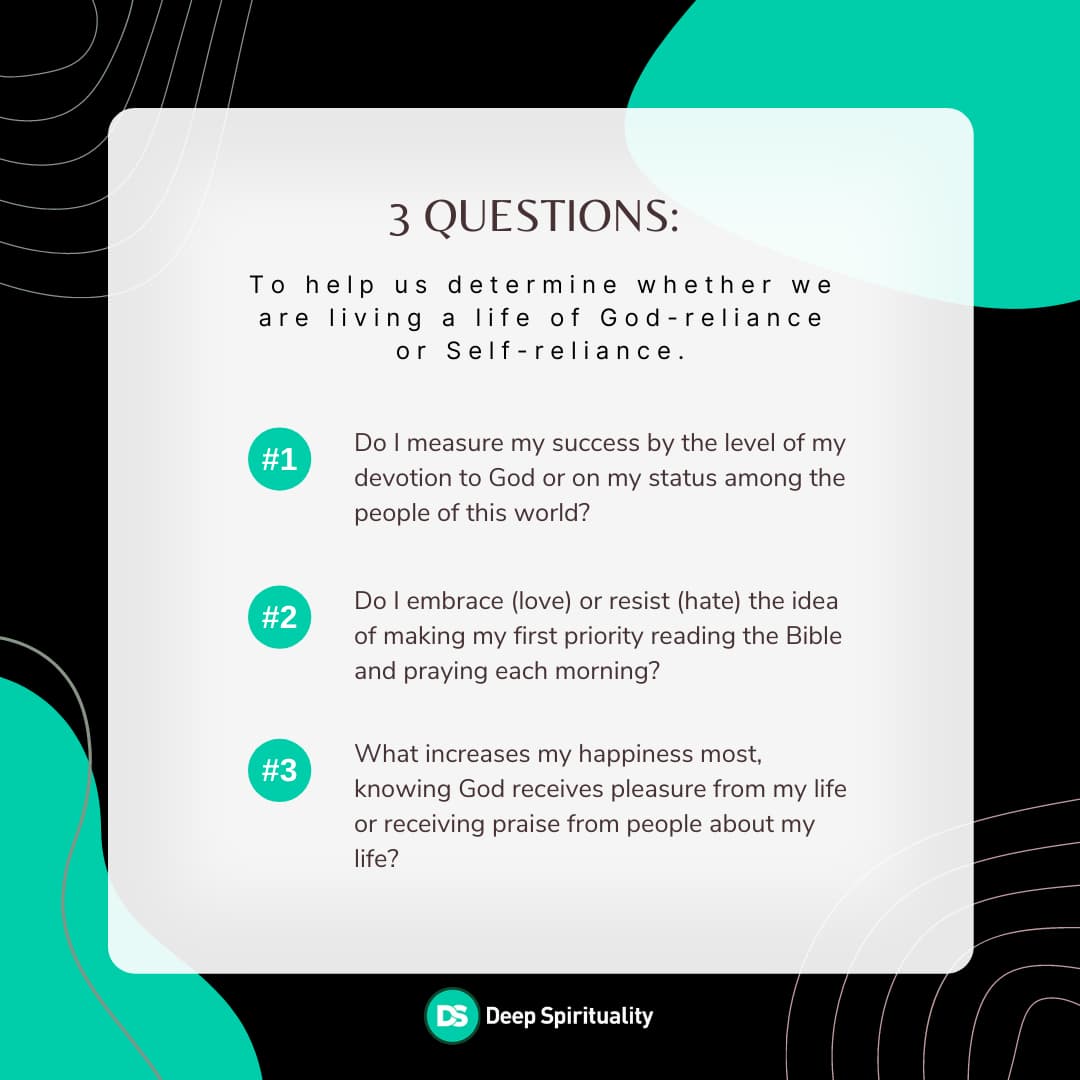
Surrender our anxiety over our inability to control life
This is why I tell you to never be worried about your life, for all that you need will be provided, such as food, water, clothing—everything your body needs. Isn’t there more to your life than a meal? Isn’t your body more than clothing?
Matthew 6:25 TPT
Spirituality is about our ability to let go — to give up trying to control life.
Jesus speaks in Matthew 6:25 about never worrying about our lives, which means acknowledging we have no control. Rather than becoming overwhelmed by this truth, we can recognize the opportunity God is offering us through faith.
Surrendering our anxiety gives us the chance to have a deeper, richer, and more meaningful life — one that exceeds the anxious striving of chasing power, position, prestige, and possessions.
Stop overreaching, overthinking, overworking, and overreacting
Look at all the birds—do you think they worry about their existence? They don’t plant or reap or store up food, yet your heavenly Father provides them each with food. Aren’t you much more valuable to your Father than they? [27] So, which one of you by worrying could add anything to your life?
Matthew 6:26-27 TPT
Jesus calls on us to observe nature, asking the question how many burned-out birds do you see? Burnout is about overreaching, overthinking, overworking, and overreacting in the delusional pursuit to control a world we cannot control.
Anxious people overreach, overthink, overwork, and overreact until they burn out. Spiritual people live passionately, purposefully, powerfully, and patiently in their walk with God, knowing he is the only one who can bring everything in life together in a beautiful way.
Silence the internal voices keeping us enslaved to false definitions of happiness
So then, forsake your worries! Why would you say, ‘What will we eat?’ or ‘What will we drink?’ or ‘What will we wear?’ [32] For that is what the unbelievers chase after. Doesn’t your heavenly Father already know the things your bodies require?
Matthew 6:31-32 TPT
The internal voices at work in our lives are all about motives. Motives are the answers to all of our “why” questions.
Why are we so intent on getting that, being this, knowing him, dating her, going there, leaving here, receiving more, giving less, rising higher, getting out, and the biggest why of all: why don’t we tell anyone the motives behind what we’re doing?
Silencing the internal voices keeping us enslaved to the false definitions of happiness means practicing what the Scriptures call “purifying.”
Matthew 5:8 says, “Blessed are the pure in heart, for they will see God.” This means one of the most important aspects of our relationship with God is making sure our motives are pure, that what motivates us is a spiritual rather than material pursuit.
Start treating God like he is God instead of an imaginary friend or comfort toy
So above all, constantly chase after the realm of God’s kingdom and the righteousness that proceeds from him. Then all these less important things will be given to you abundantly. [34] Refuse to worry about tomorrow, but deal with each challenge that comes your way, one day at a time. Tomorrow will take care of itself.”
Matthew 6:33-34 TPT
A.W. Tozer called it the pursuit of God, “that chasing after the realm of God’s kingdom and righteousness.” In my view, this is when we start treating God like he is God instead of an imaginary friend or comfort toy.
The moment we start treating God like he is God is the moment when we acknowledge the cross and resurrection are so real and important as to allow them to alter our life values from the material to the spiritual.
We do this knowing it will greatly reduce if not eliminate the anxiety which is the enemy of the powerful spirituality Jesus longs to manifest in our lives to the glory of God.
More in
More in
As the editor in chief for Deep Spirituality, Russ Ewell writes, teaches, and innovates with his eyes on the future. His teaching is rooted in providing hope for those turned off by tradition and infused with vision for building a transformative church. His passion to inspire even the most skeptical to view God through fresh eyes can be found in his book, He's Not Who You Think He Is: Dropping Your Assumptions and Discovering God for Yourself.
As the editor in chief for Deep Spirituality, Russ Ewell writes, teaches, and innovates with his eyes on the future. His teaching is rooted in providing hope for those turned off by tradition and infused with vision for building a transformative church. His passion to inspire even the most skeptical to view God through fresh eyes can be found in his book, He's Not Who You Think He Is: Dropping Your Assumptions and Discovering God for Yourself.




